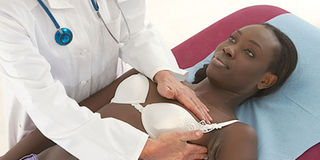Caution before you go for a test

Doing a breast examination is also more convenient after your periods. COURTESY PHOTO
What you need to know:
Getting a health test is not a simple matter of showing up and expecting a diagnosis. One must take precautions not to do certain things which interfere with results, writes Beatrice Nakibuuka.
In order for one to lead a healthy life, it is important to do frequent tests for different illnesses. This will protect you from getting late diagnosis which often leads to death. The earlier you get diagnosis, the easier it will be for you to receive treatment and the higher your chances of survival. There are some tests, however, that require caution before they are carried out or one is likely to receive wrong results.
Do not eat before a diabetes test
When going for a fasting blood glucose test (used to diagnose diabetes), you should not eat or drink anything else other than water for eight hours before your blood is drawn, says Dr William Lumu, a diabetologist at Mengo Hospital.
“Anything you consume during that time can affect the results. Hormonal birth control, blood pressure medications, certain antidepressants, all affect your sugar level. It is important that you inform your physician if you are taking any of these,” he says.
You may schedule a fasting glucose test first thing in the morning so you do not have to fast during the day.
He adds that iron blood tests to detect anaemia are usually taken in the morning before you eat anything. You should also avoid taking iron tablets for 24 hours before your test. Your body absorbs iron very quickly from food or pills, so this can raise your iron levels and affect the test results.
Not during your periods
Regardless of your sexual history, women aged 21 and older should have a Pap smear every three years to help detect any signs of cervical cancer. The same test interval can be extended in older women with a negative HPV test.
Dr Charles Kiggundu, a gynaecologist at Mulago hospital recommends, “Do this test after your menstruation periods because blood can interfere with the outcome. Also avoid intercourse, tampons or using any vaginal medicines two days before the test because these may wash away or obscure abnormal cells to give wrong results.”
Doing a breast examination is also more convenient after your periods. This is because during the periods, hormonal imbalances tend to cause mild pain at the nipple area or an increase in the size of the breasts. This may get in the way of genuine results.
No makeup, manicure or pedicure
Dr Edward Ogwang, a dermatologist at The Skin Specialist Clinic, says before you see a dermatologist, it is not advisable to get a manicure or pedicure because dermatologists look at your whole body, including your nails, so you should keep them polish-free.
“Wearing nail polish or acrylic nails may hide nail issues such as fungus, subtle clues in your nails which can indicate bigger health problems such as anaemia, diabetes, and even heart ailments. Also, skip the cover-up and eye shadow or be willing to remove it if necessary so that your doctor can easily see any problems on your face or elsewhere on the skin,” he says.
Do not get too thirsty before a urine test
If you are going for a urine test, avoid dehydration. After exercise, drink plenty of water to replace that which you may have lost.




